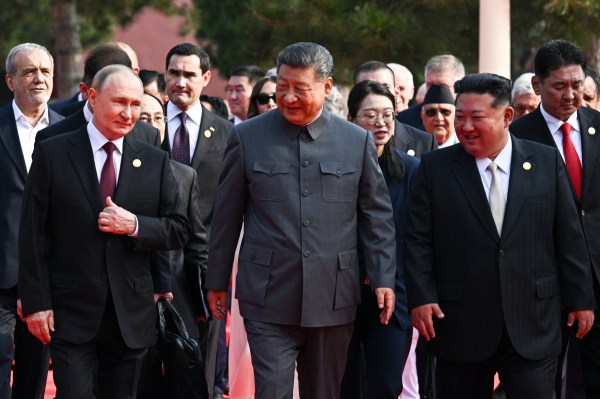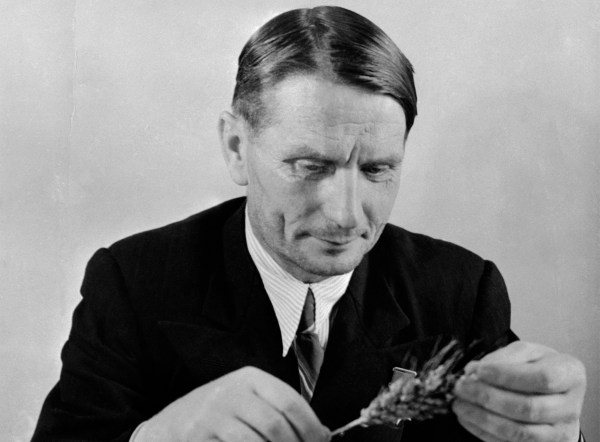A rule of thumb in journalism is that three instances of the same thing happening constitutes a “trend.” By that standard, America is experiencing a trend in terrorism against Jews.
We’ve been experiencing one for a while, actually. Last fall the FBI reported 1,832 antisemitic hate crimes in 2023, a record high since the data began being tracked more than 30 years ago. Fifteen percent of all hate crimes in the United States in 2023 were aimed at Jews, who make up just 2 percent of the population.
If it feels like things have gotten worse lately, though, that’s because they have. In April the Pennsylvania governor’s mansion was firebombed while Josh Shapiro and his family were inside; the suspect said he targeted Shapiro because of “what he wants to do to the Palestinian people.” Last month two staffers from the Israeli embassy in Washington were gunned down by a man who shouted “free, free Palestine” when he was arrested. Then, on Sunday, demonstrators marching for the release of Israeli hostages were attacked in Boulder, Colorado, by an illegal immigrant from Egypt who reportedly told police that he wanted to “kill all Zionist people and wished they were all dead.”
Three makes a trend. If a right-wing political movement had inspired three terror attacks in two months, American media would have no trouble drawing broad conclusions about that movement’s inherent propensity for violence. The intifada has in fact been globalized.
What should the federal government do about it?
My colleague Mike Warren published a righteous plea elsewhere on the site today for the president to speak up and condemn antisemitism. Donald Trump did post a statement on Monday about the Boulder attack, insisting that it “WILL NOT BE TOLERATED in the United States of America,” but framed it as an immigration issue rather than as the latest example in a string of anti-Jewish violence. He didn’t mention Jews, Israel, or antisemitism in his post at all, in fact. Even Alexandria Ocasio-Cortez managed to do better than that.
It’s “vital” that Trump speak up more forcefully, Mike argues. “There’s a message Americans need to hear now: There’s no place in America for bigotry against Jews, and no one who calls himself an American should tolerate it,” he writes.
I agree that the president should bring to bear whatever moral pressure he can muster to prevent further attacks on Jewish Americans. But there’s something a little … 2015 about demanding that he do so.
Is it still “vital” for the chief executive to model moral leadership for Americans in a moment of crisis? I want to believe that it is. But I don’t.
Low risk, high reward.
The case that Trump should speak out is unassailably simple: It can’t hurt, and it might help.
It’s a costless exercise. For the price of a few words, the president might save lives.
Donald Trump wields no moral authority over the left, but putting the country on notice that federal law enforcement is treating hate crimes against Jews as a priority might make America’s more excitable progressive intifada enthusiasts think twice. There’s surely deterrent value in letting miscreants know that they’ll be shown no mercy if they act on their impulses.
Trump does wield considerable moral authority over the right, meanwhile, and the right has an antisemitism problem of its own. A survey conducted last year by Blue Rose Research found 18-year-olds are roughly four times more likely than 65-year-olds to say that they hold an unfavorable opinion of Jewish people—and among that younger cohort, Trump’s supporters were more likely to say so than Kamala Harris’ supporters. The reasons for that are complicated (although not that complicated), but by that measure, young MAGA is the most antisemitic cohort in America.
If you worry about 20-something populists being radicalized into hostility toward Jews, and you should be, then having the most influential right-wing leader since Ronald Reagan declare such hostility anathema to his movement might fruitfully cause a few of them to think twice as well. It would be a rare example of the cultishness around Trump working for America rather than against it. If the president calls the tune morally for his diehard fans, it’s that much more important that he loudly demand respect for Jews.
Condemning the violence might also awaken the perpetually slumbering casual voter to the extent of the problem. I’d bet good money that the average joe has no idea how disproportionately Jews are targeted with hate crimes or that the attack in Boulder on Sunday was the third high-profile act of antisemitic terror since April. If you fear Americans are becoming desensitized to a dangerous social pathology, Trump can help. No one is able to focus the public’s attention on an issue as efficiently as the man who commands the bully pulpit.
In all sorts of ways, taking Mike’s advice would be good politics for Trump, too. It would give him a rare shot of moral credibility. It would buttress his case for cracking down on antisemitism at American universities. It would prove that his outrage over persecution isn’t limited to the plight of white Christians. And it would give him some political cover in case one of his Groyper fans eventually shoots up a synagogue.
If you want to be really cynical, it would also give him a handy pretext for some nefarious future executive power grab. The man loves to declare national emergencies and then assert dubious new legal authorities in the name of addressing them. Pronouncing antisemitism a major crisis that requires him to behave like an even more domineering strongman would by no means be the most dubious emergency he’s identified this year.
Oh, and in case anyone still cares about such things, there’s this: It would be the right thing to do.
Doing the right thing because it’s the right thing would be wildly out of character for Trump, but if you want a more virtuous country then it’s all to the good to have the leader setting the right example. The fact that antisemitism skews young nowadays suggests it’ll be more common in America in the future if something isn’t done to turn the tide. If the president is willing to try, we shouldn’t look a gift horse in the mouth.
So, yes, Mike is correct. And yet….
Even in a noble cause, “Donald Trump, moral leader” is so transparently a charade that to entertain it feels like being party to one of his lies.
Postmoral.
What distinguishes Trump as president from his predecessors is that he views morality as a form of weakness and makes no bones about it.
It’s not that he’s insincere when he pays lip service to moral virtue, as many politicians are. It’s that he demonstrates flagrant contempt for the concept.
Last September Joe Biden denounced the assassination attempt on Trump. Whether he meant it or not is known only to him, but saying the right thing about political violence wasn’t glaringly inconsistent with Biden’s approach to government—or Barack Obama’s or George W. Bush’s, etc. Presidents have traditionally sounded conciliatory toward political opponents who’ve suffered some terrible misfortune. However they may feel privately, they’ve shown magnanimity during moments of high public emotion to reinforce that we’re all Americans and shouldn’t sacrifice our humanity toward each other to politics.
Not one of them would have dared respond this way to news that his former opponent had been diagnosed with Stage 4 cancer:
“Donald Trump is the first president in my lifetime who does not try to unite the American people—does not even pretend to try. Instead, he tries to divide us.” That’s James Mattis writing in 2020, explaining why he couldn’t endorse his former boss for reelection. Simply put, Trump doesn’t do unity. He doesn’t even do unity within his own party. He’s for Trump and Trump alone.
Insofar as Americans want to unify behind letting him do whatever he wants, he welcomes unity. Otherwise, the question is the same as it always is: What’s in it for him?
This is what I meant earlier when I said that calling for him to speak up against antisemitism feels more 2015 than 2025. To ask him to do that is to apply a moral model of politics to a country that rejected that model emphatically last year. Americans knew Trump was a rotten character, an actual criminal with dozens of charges still pending against him, and not above trying to tear the country apart to preserve his hold on power after losing a national election. They elected him anyway.
I’d go as far as to say that he won because he’s amoral. Voters wanted someone who would be ruthless toward immigrants and criminals and regarded his sociopathy as an asset in that task. That probably also explains why there’s so much public apathy over his immense corruption: We all knew what we were getting. You can’t hire the Joker to do a job and then get mad when he starts stealing.
Trumpism is ultimately a moral project, not a political one, a bid to substitute the will to power for Christianity as the moral bedrock of right-wing politics. By definition, the person at the center of that alternate morality can’t supply meaningful moral leadership against antisemitism. The sort of presidential statement that Mike is imagining would be a classic appeal to the proverbial better angels of our nature, a vintage, “This isn’t who we are.” But it’s no longer clear who we are: If Trump’s political success proves anything, it’s that Americans are a lot less angelic than many of us once believed.
If voters prefer to be governed by ruthless sociopaths, I’d prefer that they not flatter themselves about their supposed virtue by asking Trump to meet the same moral expectations as the sort of presidents they used to elect. The best he might realistically do if he speaks out about Boulder is to go through the motions and play-act a condemnation for the sake of getting critics off his back. And if he does, the same people who elected him because he doesn’t do morality or national unity will pretend that he cares and applaud. It would be a farce on all sides, and American politics has had enough farces …
… unless, of course, even an insincere condemnation of violence against Jews by the president manages to deter some bad actors.
Sincere insincerity.
I spent 20 minutes this morning debating with my editors whether Trump should denounce the recent attacks if he doesn’t actually care about them, even if there’s nothing in it for him in doing so. They eventually persuaded me that the answer is “yes.”
Doing the right thing for the wrong reasons is still doing the right thing. And there surely are Trump supporters out there fanatic enough in their loyalty or ignorant enough about his character (even now!) that they actually do assign moral weight to his opinions. What you and I recognize as him going through the motions might persuade the “Camp Auschwitz” wing of populism to abstain from joining in the intifada fun.
But here again there’s a moral dilemma: Why is there a “Camp Auschwitz” wing in the first place? How much can we reasonably praise Trump for speaking up now when his movement helped make right-wing culture hospitable enough to antisemitism that young Trump voters outnumber even progressive chuds in polls of hostility to Jews?
The New York Times published a useful piece on Tuesday revisiting the president’s long history of gladhanding racists and their fellow travelers, some of whom now work for his administration. His most powerful political backer, Elon Musk, subscribes to the “great replacement theory” and has turned Twitter into the “Nazi bar” of social media platforms. His old pal Kanye West released a new song last month titled, I kid you not, “Heil Hitler.” Trump himself has promoted antisemitic stereotypes, albeit without the usual venom. And while he has condemned antisemites before, he typically does so reluctantly, only after being browbeaten by the media into doing so.
It’s not that he disdains Jews—his daughter and grandchildren are Jewish—so much as that he can’t bring himself to disdain anyone, including those who disdain Jews, if they support him. That’s postliberalism in a nutshell: The only moral failure that will disqualify you from the movement is failing to support the leader. So long as you’re with him, you won’t be judged for whichever noxious form of authoritarianism your politics happens to take.
How does a leader like Trump speak with moral authority about antisemitism now, having enabled a political culture as repulsive as that? How can anyone except his most devoted toadies take him seriously?
I suspect that’s one of the reasons he hasn’t condemned the Boulder attack more forcefully. Doing so will only invite more media scrutiny of his own terrible amorality about right-wingers being bigoted toward Jews. Perhaps he even fears that doing so will piss off too many of his own fans: As much as they’d enjoy seeing him berate left-wingers for their immorality, a rousing defense of Jewish Americans might seem a bit too “establishment” for certain populists.
Or maybe it’s his staff that’s urged him to lie low, remembering the “very fine people on both sides” fiasco when he spoke about the Charlottesville rally in 2017. It’s possible, maybe even likely, that if Trump delivered public remarks condemning the string of recent attacks on Jews he’d end up veering off-script and shoot himself in the foot. If you can’t imagine him offhandedly blaming Israel for the intifada attacks because Benjamin Netanyahu won’t heed his advice to end the war in Gaza, you haven’t been watching the same guy I have for the past 10 years.
In the end, though, I assume he will have something to say about Boulder. Trump and his movement have created enough of a cultural monster on the right that him remaining silent about it would look suspicious in a way that, say, George W. Bush remaining silent would not. And Trump will eventually figure out that he would be the main beneficiary of denouncing the incident, earning a bit of hopeful “strange new respect” from voters who haven’t yet made peace with the reality that the government they elected last year holds traditional morality in contempt.
I hope Trump speaking up does some good. It’d be a pity to go through the charade for nothing.







Please note that we at The Dispatch hold ourselves, our work, and our commenters to a higher standard than other places on the internet. We welcome comments that foster genuine debate or discussion—including comments critical of us or our work—but responses that include ad hominem attacks on fellow Dispatch members or are intended to stoke fear and anger may be moderated.
With your membership, you only have the ability to comment on The Morning Dispatch articles. Consider upgrading to join the conversation everywhere.